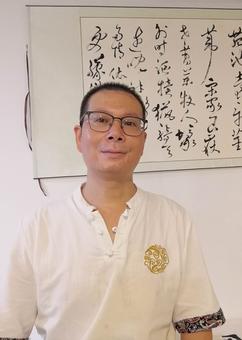Wang Hongkun
Wang Hongkun
Personal Profile
Wang Hongkun
——Master of Chuanghai Wen Zhai
Native place Anhui, according to family records, he is a descendant of Prince Jin from the same ancestor as Wang Xizhi. Now resides in Panyu, Guangzhou.
Inheritor of traditional Chinese art;
Member of the Taiji Painting Academy;
Calligraphy tutor of Chuanhai Art Academy;
President of Guangzhou Media Calligraphy and Painting Association;
Member of Dashi Calligraphy and Art Association, Guangzhou;
Founder of Chuanhai Yijia Club.
Mr. Wang Hongkun has been interested in calligraphy since childhood under the influence of his parents. According to his memory, the first brush script he encountered was "Yueyi Lun" collected by his father. At the end of the 1990s, while running a stamp and cultural shop in his hometown Anhui, he had the fortune to meet a group of local calligraphy, painting and seal carving enthusiasts. Through exchanges and mutual learning, he began to understand the ideological and philosophical dimensions of calligraphy.
After 2000, he worked for nearly twenty years at the Guangzhou Daily Group, and used his spare time to practice copying scripts in stages, such as "Erlang Fa Tie", "Sun Guoting's Shupu", and "Shu Su Liang Yin Fu Jing". By learning from the ancients and exploring new methods, he overcame many knowledge turning points and difficulties in calligraphy study, making each script style more integrated. He summarized a set of important theoretical methods for calligraphy learning. The four characters "Zhong, Mian, Bian, Liu" he proposed concentrate on the essence of calligraphy brushwork. Learning calligraphy not only requires technical learning, but also requires understanding and perception of traditional cultural thoughts.
He is good at using philosophical thinking to interpret and experience. For example, the process of learning calligraphy itself is a gradual progression from quantitative change to qualitative change. The handling of techniques often follows the principle of "both opposing and unified": changes in thickness, rhythm speed, dryness and moisture, concentration and lightness, density control, slanting and upright, broken brushstrokes with continuous meaning, mutual gaze and generation, and the generation of rationality and sensibility. In order to pursue unexpected writing effects, he once tried "wet writing" innovation, which subtly conforms to the phenomenon of sudden change in cosmic laws.
He believes that every Chinese person should have the historical responsibility and obligation to inherit calligraphy. By founding Chuanhai Yijia Club, he aims to let more people truly understand and love calligraphy, making calligraphy learning a part of people's life for self-cultivation and moral improvement, and enabling Chinese calligraphy to flourish, embracing all rivers and flowing endlessly.
Inheritor of traditional Chinese art;
Member of the Taiji Painting Academy;
Calligraphy tutor of Chuanhai Art Academy;
President of Guangzhou Media Calligraphy and Painting Association;
Member of Dashi Calligraphy and Art Association, Guangzhou;
Founder of Chuanhai Yijia Club.
Mr. Wang Hongkun has been interested in calligraphy since childhood under the influence of his parents. According to his memory, the first brush script he encountered was "Yueyi Lun" collected by his father. At the end of the 1990s, while running a stamp and cultural shop in his hometown Anhui, he had the fortune to meet a group of local calligraphy, painting and seal carving enthusiasts. Through exchanges and mutual learning, he began to understand the ideological and philosophical dimensions of calligraphy.
After 2000, he worked for nearly twenty years at the Guangzhou Daily Group, and used his spare time to practice copying scripts in stages, such as "Erlang Fa Tie", "Sun Guoting's Shupu", and "Shu Su Liang Yin Fu Jing". By learning from the ancients and exploring new methods, he overcame many knowledge turning points and difficulties in calligraphy study, making each script style more integrated. He summarized a set of important theoretical methods for calligraphy learning. The four characters "Zhong, Mian, Bian, Liu" he proposed concentrate on the essence of calligraphy brushwork. Learning calligraphy not only requires technical learning, but also requires understanding and perception of traditional cultural thoughts.
He is good at using philosophical thinking to interpret and experience. For example, the process of learning calligraphy itself is a gradual progression from quantitative change to qualitative change. The handling of techniques often follows the principle of "both opposing and unified": changes in thickness, rhythm speed, dryness and moisture, concentration and lightness, density control, slanting and upright, broken brushstrokes with continuous meaning, mutual gaze and generation, and the generation of rationality and sensibility. In order to pursue unexpected writing effects, he once tried "wet writing" innovation, which subtly conforms to the phenomenon of sudden change in cosmic laws.
He believes that every Chinese person should have the historical responsibility and obligation to inherit calligraphy. By founding Chuanhai Yijia Club, he aims to let more people truly understand and love calligraphy, making calligraphy learning a part of people's life for self-cultivation and moral improvement, and enabling Chinese calligraphy to flourish, embracing all rivers and flowing endlessly.
para-title
TAG:
Wang Hongkun

 中文
中文  en
en 
